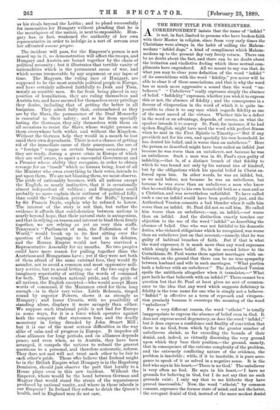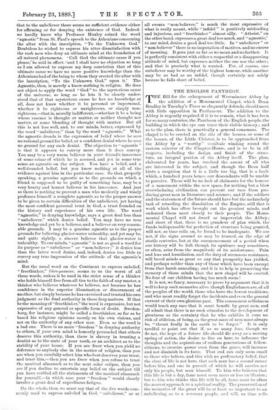THE BEST TITLE FOR UNBELIEVERS.
.A..CORRESPONDENT insists that the name of "infidel" is not, in fact, limited to persons who have broken faith with their Master in religion, since from very early times the Christians were always in the habit of calling the Mahom- medans " infidel dogs," a kind of compliment which Mahom- medal's up to the present day very freely return. There can be no doubt about the fact, and there can be no doubt about the irritation and vindictive feeling which these mutual com- pliments have engendered. All we meant to say was that, do what you may to clear your definition of the word " infidel " of its associations with the word " fidelity," you never will be able to clear it of these associations, and that is why the word has so much more aggressive a sound than the word " un- believer." " Unbeliever " really expresses simply the absence of belief. "Infidelity" expresses, whether you wish it to express this or not, the absence of fidelity ; and the consequence is a flavour of vituperation in the word of which it is quite im- possible to clear it to any race which regards fidelity as one of the most sacred of the virtues. Whether this be a defect in the word or an advantage, depends, of course, on what the speaker intends it to convey. St. Paul, for instance, if he had spoken English, might have used the word with perfect fitness when he said in the First Epistle to Timothy,—" But if any provideth not for his own, and specially his own household, be has denied his belief, and is worse than an unbeliever." Here the person so described might have been called an infidel just because he was worse than an unbeliever, not because he was an unbeliever. Such a man was in St. Paul's eyes guilty of infidelity,—that is, of a distinct breach of that fidelity to which he was bound not only by his natural ties of kindred, but by the obligations which his special belief in Christ en- forced upon him. In other words, he was an infidel, but, as we said before, not because he was an unbeliever, but because he was worse than an unbeliever, a man who knew that he owed fidelity to his own household both as a man and as a Christian, and was nevertheless unfaithful. To have called such a one an infidel would have been perfectly just, and the Authorised Version commits a bad blunder when it calls him worse than an infidel. St. Paul did not so call him. He called him worse than an unbeliever,—say, an infidel,—not worse than an infidel. And the distinction exactly touches our objection to the use of the word "infidel" as describing the absence of belief. One who was not faithful to his domestic duties, who violated obligations which he recognised, was worse than an unbeliever just on that account—namely, that he was guilty of habitual breaches of faith. But if that is what the word expresses, it is much more than any word expresses which simply denies belief. So, in the second letter to the Corinthians, St. Paul warns them against marriages with un- believers, on the ground that there can be no true sympathy between husband and wife in such marriages. " What portion hath a believer with an unbeliever." The Authorised Version spoils the antithesis altogether when it translates,—" What part hath he that believeth with an infidel r There cannot be a question but that St. Paul at least gives no sort of counten- ance to the idea that any word which suggests deficiency in fidelity is the true name for one who is simply not a believer. " Infidel " is effective as a term of reproach and vitupera- tion precisely because it oversteps the meaning of the word " unbeliever."
For a very different reason, the word " atheist " is totally inappropriate to express the absence of belief even in God. It does not express moral degeneracy, as does the word " infidel ;" but it does express a confidence and finality of conviction that there is no God, from which by far the greater number of unbelievers shrink, as far exceeding the bounds of their denial, and, indeed, as virtually disowning the very ground upon which they base their position,—the ground, namely, that in consequence of the extreme complexity of the problem, and the extremely conflicting nature of the evidence, the problem is insoluble ; while, if it be insoluble, it is pure arro- gance to speak of it as solved in a negative sense. It is the fool who says in his heart,—' There is no God.' The unbeliever is very often no fool. He says in his heart,—' I have no grounds for believing in God, but I do not say that no such grounds exist; I only say that to me hitherto they have proved inaccessible.' Now, the word "atheist," by common consent, expresses the former state of mind, and not the latter, the arrogant denial of God, instead of the more modest denial that to the unbeliever there seems no sufficient evidence either for affirming or for denying the existence of God. Indeed, we hardly know why Professor Huxley coined the word "agnostic" from St. Paul's speech to the Athenians concerning the altar with the inscription, " To the Unknown God." Doubtless he wished to express his utter dissatisfaction with the rash men who deny an ultimate mind at the foundation of all natural phenomena. Call God the ultimate cause if you please,' he said in effect, 'and I shall have no objection so long as I am allowed to express my deep conviction that of this ultimate cause we have no more positive knowledge than the Athenians had of the being to whom they erected the altar with the inscription, "To the Unknown God," upon it.' The Agnostic, then, is merely a know-nothing in religion. He does not object to apply the word " God" to the mysterious cause of the universe, so long as he lets it be clearly under- stood that of that mysterious cause he has no knowledge at all, does not know whether it be personal or impersonal, whether it be righteous or unrighteous, or simply non- righteous,—that is, morally indifferent,—whether it he a being whose essence is thought or matter, or neither thought nor matter, or some blending of thought with matter. But all this is not less well, and, to our minds, better, expressed by the word " unbeliever," than by the word " agnostic." What the agnostic dreads is the expression of belief where he sees no rational ground for belief, or a confident denial where he sees no ground for any such denial. The objection to agnostic " is that it appears to convey more than it does convey. You may be a very warm believer in your friend's innocence of some crime of which he is accused, and yet in some true sense an agnostic on the subject. You have a belief, and a well-founded belief, but you know nothing at all of the evidence against him in the particular case. So that, properly speaking, a genuine agnostic as to the grounds on which a friend is supposed to be guilty of something base, may be a very hearty and honest believer in his innocence. And just so there is nothing to prevent a man who modestly and wisely professes himself a complete agnostic as to the proper answer to be given to certain difficulties of the unbeliever, yet having the most confident personal trust in God, a trust founded on the history and experience of his own life. The word "agnostic," in denying knowledge, says a great deal less than " unbeliever," which denies belief. You may have no true knowledge and yet be a believer, and a believer on very reason- able grounds. I may be a genuine agnostic as to the proper grounds for believing glacier-water unhealthy, and yet may be, and quite rightly, a sincere believer that glacier-water is unhealthy. To our minds, " agnostic" is not as good a word for its purpose as " unbeliever " or " non-believer ;" it denies less than the latter word denies, and, indeed, denies too little to convey any true impression of the attitude of the agnostic's mind.
But the usual word on the Continent to express unbelief, " freethinker," Libre-penseur, seems to us the worst of all these words, unless it be used in the strict sense of a thinker who holds himself free from all ties to the faith of any master, a thinker who believes whatever he believes, not because he has confidence in the superior illumination or discernment of another, but simply because he has exercised and trusted his own judgment as the final authority in these deep matters. If that be the meaning of "freethinker," the word is expressive, but not expressive of any general or specific form of doubt. Sweden- borg, for instance, might be called a freethinker, so far as he based his religious opinions merely on his own visions, and not on the authority of any other seer. Even so the word is a bad one. There is no more "freedom " in denying authority to others, if your own mind is honestly persuaded that others deserve this authority, than there is slavery in trusting a dentist as to the state of your teeth, or an architect as to the stability of your house. If you are freer when you yield no deference to anybody else in the matter of religion, than you are when you carefully select him who best deserves your trust, and trust him,—then you are freer when you refuse to trust the nautical almanack as to the next solar eclipse, than you are if you decline to entertain any belief on the subject till you have verified all the statements of the nautical almanack for yourself,—in which case your " freedom " would clearly involve a great deal of superfluous fatigue.
On the whole, then, we must say that of the five words com- monly used to express unbelief in God, " unbeliever," or at all events "non-believer," is much the most expressive of what is really meant, while " infidel " is positively misleading and injurious, and " freethinker " almost silly. " Atheist," on the other hand, expresses a great deal too much, and " agnostic,' to our mind, denies a good deal too little. In " unbeliever " or " non-believer " there is no imputation of motives, and no excess of meaning. It goes just as far as we mean and no farther. It is perfectly consistent with either a respectful or a disapproving attitude of mind, but expresses neither the one nor the other ; and that is precisely what is wanted. For, of course, one unbeliever may be worthy of the highest honour, while another may be as bad as an infidel, though certainly not solely because he falls short of belief.



































 Previous page
Previous page